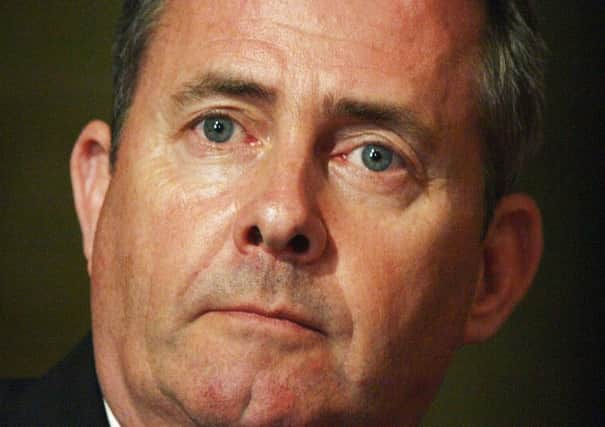Ministers in Brexit row over movement of labour: Clashes in Cabinet over post-EU arrangements


International Trade Secretary Liam Fox yesterday appeared to directly contradict Chancellor Philip Hammond, after insisting the Cabinet has not agreed a deal on immigration after withdrawal from the EU.
The remarks came as Chancellor Philip Hammond signalled there was “broad acceptance” in the Cabinet of a wide-ranging post-Brexit transitional period lasting up to three years.
Advertisement
Hide AdAdvertisement
Hide AdLiberal Democrat leader Sir Vince Cable claimed Dr Fox’s remarks point to a “civil war” within the Cabinet, and the war of words came as an ally of Foreign Secretary Boris Johnson also criticised Mr Hammond’s plans.
Gerard Lyons, who was an economic adviser to Mr Johnson when he was London mayor, said a two-year transition period would work better.
In an interview with The Sunday Times, Dr Fox said: “We made it clear that control of our own borders was one of the elements we wanted in the referendum, and unregulated free movement would seem to me not to keep faith with that decision.”
The International Trade Secretary said he had not been involved in any Cabinet talks on extending free movement for up to three years after Brexit, stating: “If there have been discussions on that I have not been party to them. I have not been involved in any discussions on that, nor have I signified my agreement to anything like that.”
Advertisement
Hide AdAdvertisement
Hide AdIn remarks that are likely to be seen as directed at the Chancellor, Dr Fox said: “I am very happy to discuss whatever transitional arrangements and whatever implementation agreement we might want, but that has to be an agreement by the Cabinet.
“It can’t just be made by an individual or any group within the Cabinet.”
Mr Hammond said on Friday the transitional period up to 2022 would mean “many arrangements remaining very similar to how they were the day before we exited the European Union”.
The Chancellor said there would be a registration system in place for people coming to work in the UK after Brexit during the transitional period. A Government source said that freedom of movement will end when Brexit occurs in March 2019, and a time-limited implementation period would then follow.
Advertisement
Hide AdAdvertisement
Hide AdThe source said that the idea of mass, uncontrolled migration is “not a vision of Brexit that we will undertake”.
However, the EU has made it clear continued access to the single market is dependent on free movement of labour.
Tory tensions were also on show as former Brexit Minister David Jones branded Mr Hammond’s transition initiative “deeply dangerous” as he accused the Chancellor of “going on manoeuvres” while Prime Minister Theresa May was abroad on holiday.